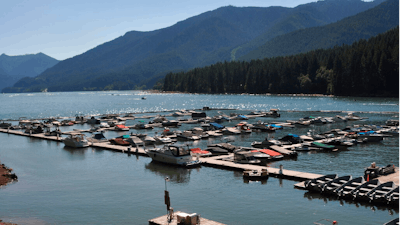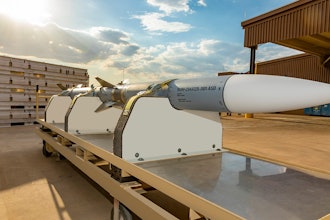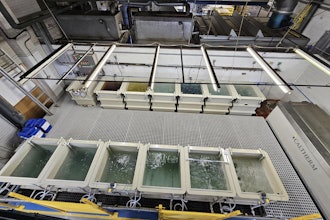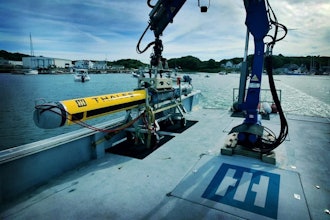
SALEM, Ore. (AP) — The U.S. Army Corps of Engineers has determined that a large earthquake — which is expected to occur again in the Pacific Northwest sooner or later — could cause the spillway gates of a dam in Oregon to buckle, resulting “in a potentially catastrophic flood.”
The Corps announced late Monday it will try to minimize the danger by reducing the maximum height of the lake by five feet starting in April. Hundreds of thousands of people, including those in the state capital, live downstream from the Detroit Dam, whose construction in the 1950s created the narrow, nine-mile long Detroit Lake.
The move comes as Oregon and the wider Pacific Northwest are coming to grips with “the big one” that experts say is coming. Earthquakes in the Cascadia subduction zone, which extends from the ocean off Northern California to Canada’s Vancouver Island, have an average magnitude of around 9, making them among the world’s biggest.
A quake in that zone has a 37% probability of happening off Oregon's coast in the next 50 years, according to Chris Goldfinger, an Oregon State University professor and earthquake geologist.
Just last week, an earthquake early warning system was launched in Oregon. Operated by the U.S. Geological Survey, the state joined California in the system that sends alerts to smart phones. Washington state is expected to join the ShakeAlert system, which operates on an array of seismic sensors, in May.
“When a Cascadia event happens, the critical seconds of notice ShakeAlert warnings provide will save lives and reduce damage to important lifeline systems,” Oregon Gov. Kate Brown said the day it launched, on Thursday.
Lawmakers are also trying to prepare the state for a major earthquake.
In the Oregon Legislature, House Bill 3083 mandates that contracts for public works must adhere to seismic safety standards and seismic rehabilitation standards in constructing or renovating public buildings or critical infrastructure in earthquake-prone areas. A House committee has a work session scheduled for the bill on April 1.
Lindsay Baker, an assistant director of the Oregon Department of Transportation, raised concerns about the bill, saying “there is simply not sufficient funding to fully armor the entire transportation system in a reasonable timeframe.”
But Baker later told the House Committee on General Government she was relieved to hear that the state's transportation system is not the focus of a new standard for seismic resiliency.
In 2020, the U.S. Army Corps of Engineers completed a seismic hazard analysis for Detroit Dam, and found the risk to be higher than Corps officials previously thought.
“Structural analysis has shown a possibility of the spillway gates buckling under the force of a full reservoir during a large earthquake,” the Corps said in its statement. “Risk is high enough to warrant immediate actions.”
A breach would send a surge of water shooting down the Santiam Canyon, which was devastated by a wildfire last summer, and onto where it opens up on the eastern edge of the Willamette Valley.
“Because Detroit Dam is located upstream of many communities including the state capital of Salem, Oregon, there is potential for devastating flooding to affect large portions of the narrow North Santiam River canyon and urban areas,” the Corps said in its draft environmental assessment.
Lowering the maximum level is a temporary solution to mitigate the risks and will have little impact, the Corps said. The lake is used for recreation, and most of the boat ramps would be unusable for up to a month.
The Corps said it continues to evaluate the seismic performance of the spillway and other components of the dam to determine if long-term modifications or changes to operations will be necessary. That includes the potential for major reconstruction to address seismic risk.






















